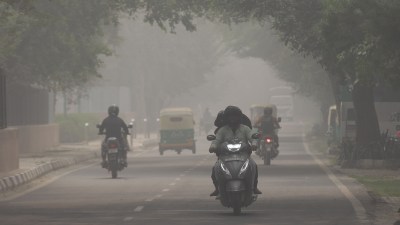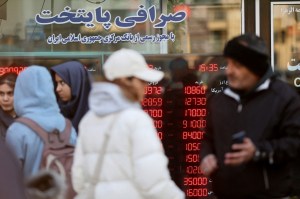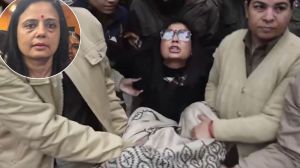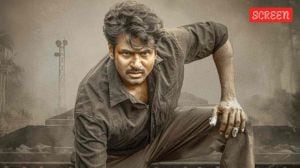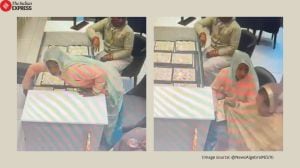The moulvi and his message
Among all the track II diplomats and unoficial peace brokers to emerge in the ceasefire, heacirc;euro;trade;s perhaps the most striking...

Among all the track II diplomats and unoficial peace brokers to emerge in the ceasefire, heacirc;euro;trade;s perhaps the most striking. Shahi Imam Syed Ahmed Bukhari has been in constant touch with militant commanders in Pakistan, with Hurriyat leaders and the Indian government.
In an interview with The Indian Express, Shahi Imam, who had appealed for a ceasefire on November 11 after his telephonic conversation with Hizbul chief Syed Salahuddin, said most of the militant commanders in Pakistan had called him up and appreciated his peace initiative. However, acirc;euro;tilde;acirc;euro;tilde;barring Salahuddin, no militant leader disclosed his identity. All those I spoke to have appreciated the peace initiative,acirc;euro;trade;acirc;euro;trade; said Syed Ahmad Bukhari.
The Shahi Imam said he was about to contact Musharraf when Prime Minister Atal Behari Vajpayee announced a unilateral ceasefire. He said he appreciated the governmentacirc;euro;trade;s move for a truce, and appealed to separatist and militant leaders for a positive response. acirc;euro;tilde;acirc;euro;tilde;However, my plan was to first talk to Pakistan and all the Hurriyat and militant leaders and then place the suggestions before the Government, so that all parties reach a consensus towards peace in the trouble-torn state,acirc;euro;trade;acirc;euro;trade; he said.
Bukhari said he was only performing his religious duty in appealing for an end to the bloodshed in Kashmir. He had neither a political agenda, nor did he offer any solutions to the problem, he said. acirc;euro;tilde;acirc;euro;tilde;The solution lies with the people of Kashmir, Pakistan and India. However, itacirc;euro;trade;s my religious and moral responsibility to provide an atmosphere for initiation of trilateral talks. In doing so, I am only rendering service to God,acirc;euro;trade;acirc;euro;trade; he said.
Bukhari said Muslims were being branded as terrorists everywhere, and that it was his duty to tell the world that Muslims are no acirc;euro;tilde;dehshatgardacirc;euro;trade;. He said, acirc;euro;tilde;acirc;euro;tilde;Kashmiris are not terrorists. We want to expose the real terrorist.acirc;euro;trade;acirc;euro;trade; Since India was talking peace, he would ask Pakistan to reciprocate.
The Shahi Imam said he didnacirc;euro;trade;t visit Srinagar on November 20 to appeal for ceasefire because the Prime Minister had already announced it. acirc;euro;tilde;acirc;euro;tilde;However, our mission is peace and I am still in touch with the concerned parties. I will contact the Pakistani government any time now.acirc;euro;trade;acirc;euro;trade;
The factors that led the Kashmiri youth to violence were also under consideration. acirc;euro;tilde;acirc;euro;tilde;Polls in Kashmir have always been rigged; there were never fair elections. Rulers were imposed on the people of state and there was no development in Kashmir. We have to see how Kashmiris were subjected to unfair treatment and what forced them to take to violence and demand freedom from India.acirc;euro;trade;acirc;euro;trade;
After he took over as Shahi Imam on October 14, his priority was to establish contact with the people of Kashmir, he said. Kashmir is the only Muslim majority state in India, there was no communication between them and Indian Muslims, he remarked. acirc;euro;tilde;acirc;euro;tilde;I want to establish contact between 70 lakh Muslims in Kashmir and their 20 crore brethren in India.acirc;euro;trade;acirc;euro;trade;
Bukhari said Kashmiris nursed grievances against Muslims in the rest of the country because the latter had remained silent despite 10 years of wanton killing of Kashmiris. acirc;euro;tilde;acirc;euro;tilde;We have sent a message across the country that if there are reports of atrocities on Kashmiri Muslims, we will protest and press the government to stop these violations. We raise our voice in favour of Palestinians and other oppressed Muslims across the world, why canacirc;euro;trade;t we show solidarity with our Kashmiri brethren,acirc;euro;trade;acirc;euro;trade; Bukhari said.
When it was pointed out that some hardline militant outfits had rejected the PMacirc;euro;trade;s ceasefire call on the ground that the first battle between Muslims and infidels had been fought in the holy month, Shahi Imam said these groups should follow the acirc;euro;tilde;acirc;euro;tilde;Suleh-Hudebiaacirc;euro;trade;acirc;euro;trade; the peace agreement between the Prophet and infidels.
Shahi Imam felt that the appointment of Jagmohan as Governor of Jammu and Kashmir in 1990 on the insistence of the BJP was a acirc;euro;tilde;blunderacirc;euro;trade;. acirc;euro;tilde;acirc;euro;tilde;It was he Jagmohan who began the genocide in Kashmir. My father Syed Abdullah Bukhari had never visited the PMacirc;euro;trade;s residence or PMO before this, but when he heard of Jagmohanacirc;euro;trade;s appointment, he had rushed to PM and told him that Jagmohan would create havoc in Kashmir. V.P. Singh replied that he was doing it under pressure from the BJP,acirc;euro;trade;acirc;euro;trade; claimed the Shahi Imam.
- 01
- 02
- 03
- 04
- 05


